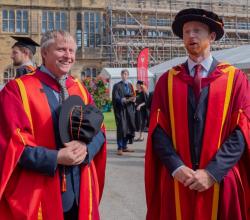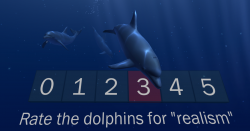Newsletters
Gaz uses AI to animate computer graphics animals
Gareth Henshall’s PhD research covered two important areas of computing: artificial intelligent algorithms and computer animation.
Why did you come to ������ϲʹ�������?
“I came to ������ϲʹ������� to study for my Undergraduate degree; I liked the degree course that ������ϲʹ������� had to offer, and because I love to sail, and am a sailing instructor with the Royal Yachting Association (RYA), I wanted somewhere with good societies where I could continue sailing. I had also always loved computer games and animation and working on my PhD with Dr Llyr ap Cenydd and Dr Bill Teahan, I was able to develop this interest into real research.”

Picture: Dr Bill Teahan with Gareth Henshall on Graduation day.
“The aim of my PhD was to explore techniques to create more realistic animation and behavior for virtual creatures, which could be used in computer games or virtual reality (VR) experiences”.&�Բ�����;
Once virtual creatures have been created by a modeler using computer software, they can be animated using a technique called procedural animation. This allows the developer to modify the behavior of the animal by adjusting parameters, which are linked to their virtual muscles and brain. However, as creatures get more complex, so potentially does the number of parameters that control them.
“It is becoming more and more difficult to master the controls and be able to create appropriately animated animals”.&�Բ�����;
What was your PhD about?
“The title of my PhD is Optimising Kinematic Systems Using Crowd-Sourcing and Genetic Algorithms. I understand that PhD titles can be long winded, so in a nutshell my thesis brings together three neat ideas: artificial intelligence (AI) algorithms and in my case Genetic Algorithms, crowd-sourcing and animation”.&�Բ�����;
A genetic algorithm can be likened to a simulation of Darwin’s Theory of Evolution whereby the fittest survive. “We can start with one version; determine how fit this version is, and then select appropriate parents, merge the genes together or mutate it in some way, and then add it to the overall population. Using these methods, we can learn which parameters work the best.”
What is crowdsourcing and why did you use it?
“C���Ƿɻ���dzܰ������Բ�is a technique to enable scientists to get people from the public involved with science, to help with the decision making. Our algorithm created many different virtual dolphins, and we asked people to rate their behavior for realism. We ran this evaluation many times, with different people, and from the results we can choose the best parameters to make the most natural looking animation and behavior”.

Picture of a dolphin from Gaz’s thesis, where participants rate the motion of the dolphins”
What are you doing now?
“Whilst studying for my PhD I was given the opportunity to develop my skills as a teacher by assisting on a variety of Undergraduate computer science modules. As a part-time lecturer I was able to gain amazing teaching experience, from giving small lecturers to running practical sessions. I undertook my PGCertHE and got a Fellowship of the Higher Education Academy. I also did some part-time lecturing at Coleg Llandrillo. I enjoy teaching and being a Head Coach for RYA Cymru Wales meant that I usually teach in a very different environment, undertaking teaching in the lecture theatre really built on and improved my existing skills.”
“I am now working as a lecturer at the University of Manchester, in the Department of Computer Science, I teach programming, databases and software engineering. I am also involved with writing and developing new Undergraduate courses. I am very grateful for my time at ������ϲʹ������� and the opportunities that it gave me. I gained invaluable skills. Getting my PhD, as well as the teaching qualification, has enabled me to get where I am today.
My current research is on Computer Science teaching methods and I hope to be able to collaborate with colleagues at ������ϲʹ������� in the near future in the hope that my research can help develop teaching methods going forward.”
Congratulations to Gaz for gaining his PhD and his fantastic job at Manchester.
Professor Jonathan C. Roberts, School of Computer Science and Electronic Engineering
Publication date: 5 September 2019
